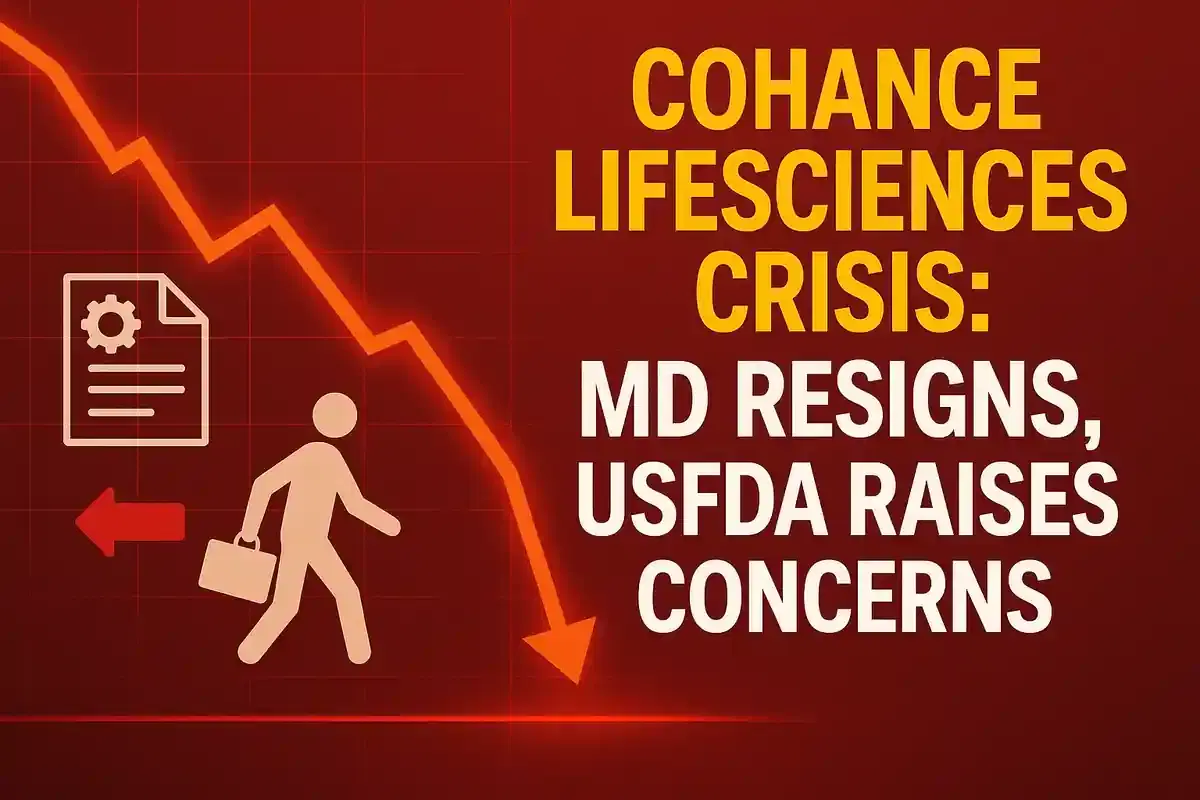Cohance Lifesciences Shares Tumble Amidst MD Resignation and USFDA Regulatory Concerns
Healthcare/Biotech
|
29th October 2025, 6:37 AM

▶
Stocks Mentioned :
Short Description :
Detailed Coverage :
Cohance Lifesciences experienced a significant stock price decline of 10.2%, reaching a 52-week low of ₹767.10 on the BSE. This downturn was primarily triggered by two major developments: the unexpected resignation of the company's Managing Director, Dr. V Prasada Raju, and a regulatory update from the US Food and Drug Administration (USFDA).
Dr. V Prasada Raju has resigned as Managing Director and Director, effective October 28, 2025. While the company stated he will remain available for a seamless transition, the reason for his departure was not disclosed by the Board of Directors. In parallel, the Nomination and Remuneration Committee approved the appointment of Himanshu Agarwal, the current Chief Financial Officer, as an Additional Director for five years, starting October 29, 2025. Agarwal joined the company in January 2024 and has prior experience with several multinational corporations.
Cohance Lifesciences also informed the stock exchanges about the USFDA's classification of its Hyderabad facility inspection as "Official Action Indicated (OAI)". The inspection of the Finished Dosage Formulations Manufacturing Facility (FDF Unit-I) at Nacharam, Hyderabad, resulted in a Form 483 with six observations. The company is working on a remediation program to align the facility with global standards.
Despite the observations, the company stated that the Nacharam unit contributes less than 2% of its consolidated US revenues and less than 1% of EBITDA. Therefore, Cohance Lifesciences does not anticipate any material impact on its ongoing operations or supplies and remains committed to maintaining high quality and regulatory compliance.
Impact The resignation of a key executive and the USFDA's regulatory classification create uncertainty for investors, leading to a sharp decline in stock price and a 52-week low. The company's proactive approach to remediation and the minimal financial contribution of the affected facility might mitigate long-term damage. Impact Rating: 6/10
Difficult Terms: Tumbled: Fell sharply or suddenly. Managing Director (MD): The senior executive responsible for the day-to-day running of a company. 52-week low: The lowest price at which a stock has traded during the past 52 weeks (one year). BSE: Bombay Stock Exchange, a major stock exchange in India. Benchmark Sensex index: A stock market index representing the weighted average of 30 well-established and financially sound companies listed on the Bombay Stock Exchange. Selling pressure: When many investors want to sell a stock, driving its price down. Stock exchanges: Markets where securities like stocks are bought and sold. Board of Directors: A group of people elected by shareholders to oversee a company's management. Key Managerial Personnel (KMP): Senior individuals like MD, CFO, Company Secretary, etc., responsible for managing the company's affairs. Seamless transition: A smooth and uninterrupted handover of responsibilities. Nomination and Remuneration Committee: A committee of the board of directors responsible for executive compensation and board nominations. Additional Director: A director appointed by the board who holds office until the next annual general meeting. US Food and Drug Administration (USFDA): A federal agency responsible for protecting public health by ensuring the safety, efficacy, and security of human and veterinary drugs, biological products, and medical devices. Official Action Indicated (OAI): A classification by the USFDA indicating that the inspection found conditions that may be violative of the Federal Food, Drug, and Cosmetic Act or related acts. Finished Dosage Formulations (FDF): The final form of a drug product that is ready for administration to the patient (e.g., tablets, capsules, injections). Form 483: A list of observations issued by the USFDA during an inspection that identifies conditions the investigator believes may constitute violations of the U.S. Food, Drug, and Cosmetic Act and related regulations. Remediation program: A plan to correct deficiencies or problems identified during an inspection. Global standards: Standards recognized and accepted internationally, often related to quality and safety. Ebitda: Earnings Before Interest, Taxes, Depreciation, and Amortization, a measure of a company's operating performance. Consolidated US revenues: Total revenue from sales in the US, combined from all subsidiaries and business units. Regulatory compliance: Adherence to laws and regulations set by government agencies.